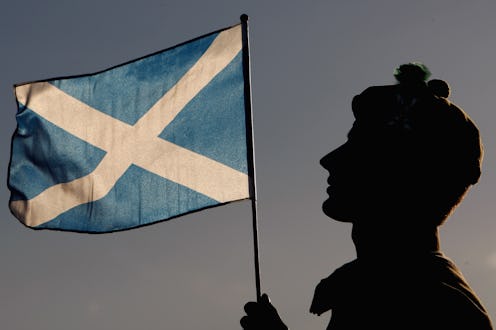News
Here's What Happened In Scotland's Historic Vote
On Thursday, voters in Scotland chose to remain with the United Kingdom, with 55 percent voting "no" to independence and 45 percent voting "yes." A whopping 97 percent of Scotland's populace registered to vote for the historic decision, and over 80 percent of eligible voters made an appearance at the polls to decide Scotland's fate. Arguments on both side of the fence remained strong until the end as Scots debated ending a 307-year-old union with the U.K.
The question posed to voters was simple: "Should Scotland be an independent country?" Campaigns have rallied hard on both sides, with those voting "Yes" maintaining that Scotland's government is not, in fact, elected by Scots, whereas those on the "No" side citing the logistical issues that would arise with independence.
Though the vote may have come as a surprise to many, trouble has been brewing in the paradise of the United Kingdom for quite some time. A similarly monumental vote happened exactly 40 years ago, when for the first time, the Scottish National Party began gaining major momentum in the political arena of the United Kingdom. Their popularity was largely based on a platform of self-governance, and while there was no real implication of a separation from England, the seeds of revolution were subtly planted.
That year, polls determined that 17 percent of the Scottish population were in favor of independence from the U.K,. while 85 percent preferred self-governance while remaining a part of the larger union. This would provide economic stability for the small country, and allow them to continue to reap the benefits of a British partnership, including membership to the European Union and NATO.
Moreover, maintaining the relationship will allow Scotland to continue using the British pound, and provide a sense of stability, both economic and social.
But in the decades since, the thought of independence has never truly been put to bed. In fact, Scottish parliamentary records show that support for the notion has steadily increased since the option was first raised. Political ideologies have grown further and further apart, with traditionally liberal Scotland often failing to see eye to eye with much more conservative England. In the last Scottish election, only one member of the Conservative Party was elected to their Parliament.
Anticipation for the outcome remained high throughout the night, with many pubs staying open to allow eager voters to wait out their nation's fate. And for the embattled "Yes" voters, that last drink may have to tide them through until the next referendum.
